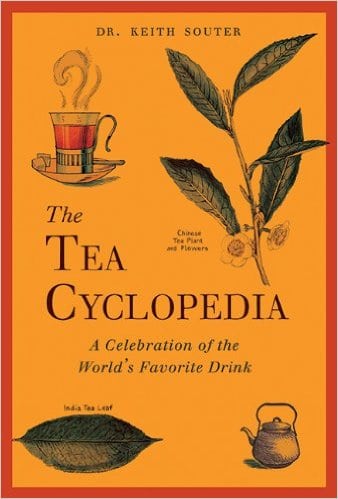 This is a pretty unassuming little book, but turned out to be a solid read. The style of the cover actually mislead me into thinking it was a lot older than it was–I figured a reprint of a 1970s book–but it was actually published in 2013. I will say there are definitely a lot of books that cover most of the same subjects in about the same amount of depth, but this one does have a few merits I haven’t seen in too many ‘general tea’ books.
This is a pretty unassuming little book, but turned out to be a solid read. The style of the cover actually mislead me into thinking it was a lot older than it was–I figured a reprint of a 1970s book–but it was actually published in 2013. I will say there are definitely a lot of books that cover most of the same subjects in about the same amount of depth, but this one does have a few merits I haven’t seen in too many ‘general tea’ books.
The book really does try to be all-encompassing, and is broken up into three parts. The History of Tea, Taking Tea, and Using Tea. There’s eighteen chapters in total, but most are pretty short.
Despite having read several books on the general history of tea already, I found the history section pretty solid. It does spend a chunk on China, and goes over the history of the word, and the great classics. It also goes into the Opium Wars in much more detail than any of the anglo-centric OR china-centric books I’ve read so far, and history isn’t even the focus of the book. It does away with the storytelling aspect of history books and focuses more on the facts. The treaties, wars, and years.
Some other pros I found with this book, moving onto part two, are that it details tea processing fairly well, as well as including general information about the different tea types. It doesn’t list very many examples of individual teas, though. But this could be a pro, since it’s not made up to be a handbook. In the same section is some good information about the different tea ceremonies, etiquette and tools of different cultures. There was even a few I didn’t know about. What I did find weird, was it included Russia, Morocco, and even parts of the middle-east, but not Turkey (not in equipment, ceremonies OR etiquette…). Especially weird since chapters six and fourteen open with a picture of a turkish teacup.
Part three didn’t hold my interest as much, and I considered skipping it all together, but I’m glad I didn’t. It’s got chapters on tea cocktails, health benefits, experiments, and tea-leaf reading. As I don’t drink, I skimmed cocktails at best. The chapter on health benefits didn’t open promisingly, listing each tea and the reputed health benefits of each. But turn the page… and the entire rest of the chapter is about the chemistry of tea. The major chemical compounds and how they interact with our body, and basically what makes us think tea has the health benefits that it does. It also breaks everything down very well. I think if I had read this chapter before picking up Werkhoven’s Tea Processing, it would have greatly aided in my comprehension of his chapter on tea chemistry.
The chapter on tea experiments was also more than it seemed, and basically tied in to the chapter on health benefits, in that it showed experiments to either isolate the molecules described in the earlier chapter, or to show them in action. It was also quirky over all.
The second to last chapter is about tea in literature, but is more focuses on tea in fiction than as a bibiography (that’s at the end of the book).
The last chapter is tasseography. I’ll admit, my highschool self would have found that way cooler, but my eyes glazed over a bit. Drinking oversteeped tea with tea fannings (the best for readings) floating around your cup without a strainer, doesn’t seem that appealing.
If you’re looking for a general book on tea that doesn’t focus on telling you the history of individual teas (like many handbooks these days do), I don’t think this would be a bad choice. It gives you a solid introduction to the history, does a good job in detailing tea processing, shows you a bit of culture, and, I think, gives you at least a solid beginner’s understanding of tea chemistry.




08/01/2016 at 1:09 PM
Tea in fiction? That’s a topic I am definitely interested in.
08/01/2016 at 3:46 PM
I can actually summarize the chapter, since it was only about three pages long.
-Charles Dickens (Oliver Twist, Great Expectations and many others)
-Baroness Orzy (sic) (Old Man in the Corner)
-C.P. Snow (Death Under Sail)
-Agatha Christie (many)
09/01/2016 at 10:51 AM
Thanks.
29/03/2016 at 12:55 PM
If you like tea in fiction you might like : From Cha to Tea.
It is a very nice book about that subject (and contrary to the remark on Amazon it is in English, not Spanish, although there might be a Spanish version since it was written at a Spanish University… (if I remember correctly public version of PHD thesis))
13/01/2016 at 7:34 AM
Thanks for sharing, I’ll check this book with kindle.
14/01/2016 at 9:43 PM
It is nice to know much more about teas and I am interested with this book.
17/01/2016 at 12:07 AM
Tea Chemistry is great topic, looking forward to that.